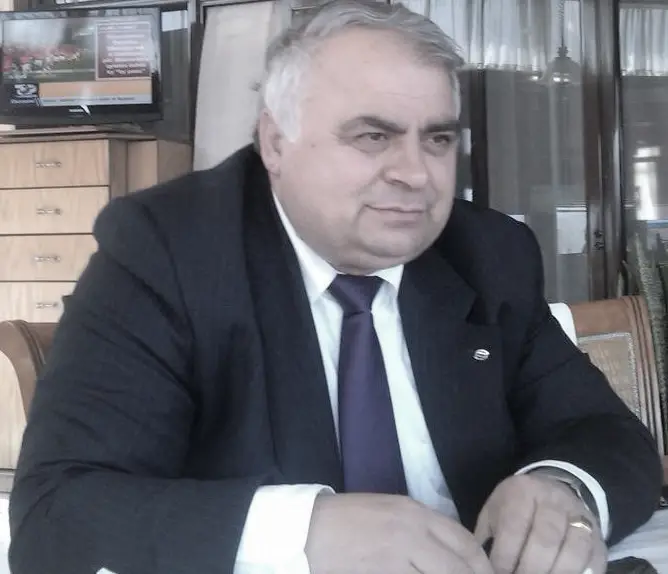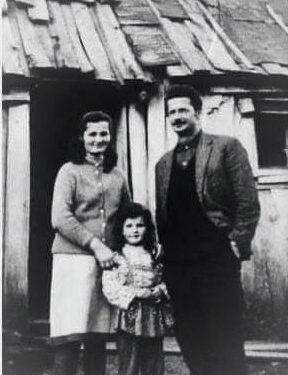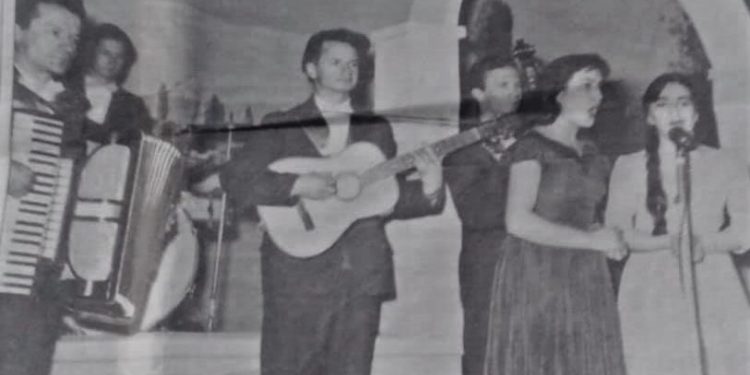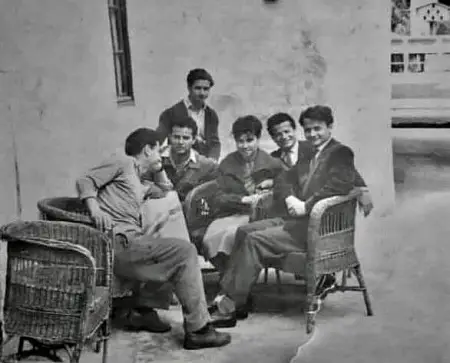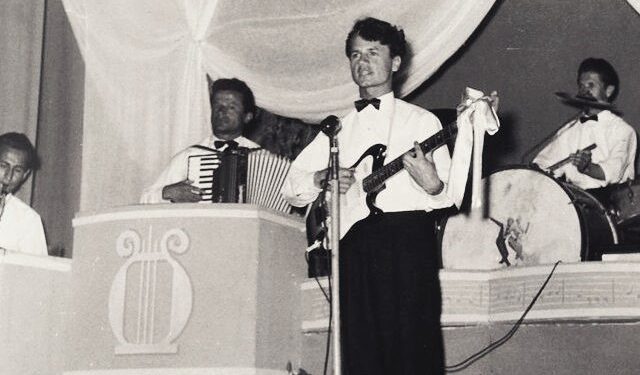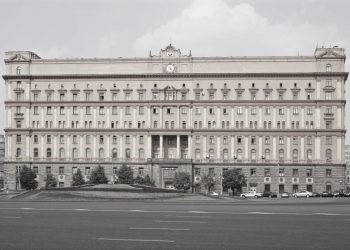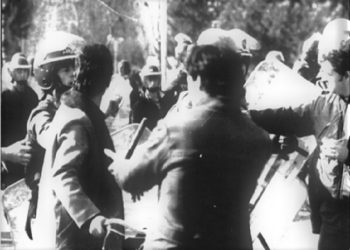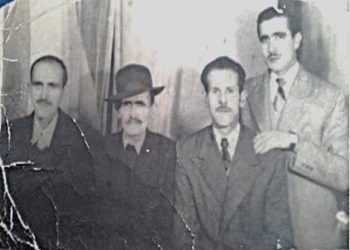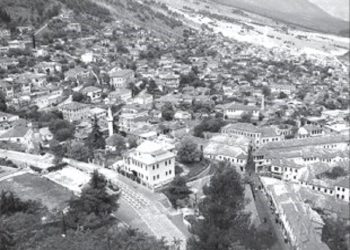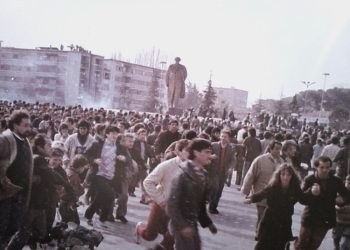From Bardhyl Berberi
– The unknown story of the five Darova brothers, virtuoso musicians who drove foreign tourists crazy in Pogradec, Durrës, Elbasan, etc., who tried the prisons of the dictatorship and found peace only in Kruja, by the first secretary of the Party Committee, Tahir Minxhozi! –
Memorie.al / who is the Darova family! They are the five sons of the prominent intellectual Nevrus Darova. For almost 40 years in the honorable teaching profession from Gjirokastra to Korça and Pogradec, he taught and educated generations of students, but unfortunately, due to the ordeal of his family, he did not enjoy a single day of retirement…! The cause is one of his sons, Dylberi, who, at the age of 15 during the war, joined the youth of the “National Front”. Although Muhameti, the elder brother of the Darova family, joins the 20th Assault Brigade and fights with a gun in hand until the liberation of the country, this did not play any role in avoiding the painful ordeal of prisons, exiles and persecution of the family of artists.
In 1946, the 15-year-old Dylber was tried in the “Morava” Cinema in Korça, where he was sentenced to 101 years in prison. In the 1950s and 1960s, the Pogradec orchestra, with the 5 Darova brothers, became famous and sought after throughout the country, even abroad. A concert in Shkodër christens Darova musicians as “Bitëllsat e Pogradec”, while numerous concerts in Elbasan, Durrës, Tirana, etc., which lift up the country’s youth, increase their fame, but also prepare another heavy ordeal for them.
The fame of an orchestra with a name in the city of Pogradec, otherwise known in the general opinion as “Pogradec’s Beatles”, consisting of the 5 Darova brothers and their family members, not only would not “soften” the stain of persecution from the connection of the 15-year-old boy with the “National Front” in the Second World War, but he would remind the communist leadership of the time to order their further punishment with decades of imprisonment and exile.
During a visit to the city by the lake, the Czech and Bulgarian prime ministers, amazed by the class of the “Darova” orchestra in the city’s tourism environment, at the end addressed the Albanian Prime Minister Mehmet Shehu, saying: “In little Albania we found a big orchestra. You have an international orchestra, colleague!”.”Hey, you’re the ones from Starova?” Mehmet Shehu addressed the musicians threateningly.
That’s all it took. Hell begins for Darova artists. Mehmeti reduced the 15-year-old sentenced to 101 years in prison to 25 years. The War had just ended. It was the year 1946 and, in the “Morava” cinema in Korça, a 15-year-old man climbed onto the dock. It is Dylber Darova, the youngest of the Darovas. It is accused that during the war he joined the youth of the “Balli Kombëtar”, in the opposing camp of the partisans. He was sentenced to 101 years in prison.
Although Muhamet Darova, his father’s older brother, had been a partisan in the War, the punishment for the 15-year-old was severe, while for the family, deportations, suffering and then imprisonment began. Returning these days to Pogradec, after 37 years, Muhamet Darova, over 80, recalls those difficult days of 6 decades ago.
It was only a short time since Dylberi was sent to the infamous prison, when Mehmet Shehu visited this camp. Among the convicts, Shehu notices a small boy, with a small body, and asks him: “What about you, boy, and how many years have you been sentenced?” “101 years” – answered Dylberi, Mehmet Shehu. “Why so much”?! – asks the prime minister. “Those who have punished me know!” – replied the 15-year-old, looking straight into Mehmet Shehu’s eyes.
Mehmet Shehu orders a reduction of the sentence for the 15-year-old; from 101 years, to 25 years in prison. As soon as he finished 10 years in prison, he was released and Dylberi, in 1956, came to Pogradec. He comes to Pogradec near his family. He gets married and gives birth to three children, while due to his biography; he is assigned to work in Hotolisht in Librazhdi, in a roadside bar, as a waiter. Dylber makes a plea to come to Pogradec, to take care of the children because he had small ones. They bring him to Pogradec. But temporarily…!
The other sentence is 20 years in prison, for agitation and propaganda
It was the 70s, at the peak of friendship with China. Dylber finds on his desk in the library, where he often went, some Chinese magazines. “Take these Chinese magazines away from me, because I can’t see them with my eyes”, he says to the library employee. There, a math teacher who was also an employee of the State Security overhears him by chance and spies on him.
Binoculars put back in the handcuffs and resume the life of the cell. He appears before the jury again. They sentence him to another 10 years in prison. This time the punishment is for “agitation and propaganda against the line of the party and popular power”. This time, the “seat” of serving the sentence for the musician Darova, is not the prison of Burrell, but that of Spaçi in Mirdita. It makes prison time day by day in this hell.
On the day he was about to leave the Spaçi prison, as soon as he was escorted by his friends and he was leaving with them, near the exit of the cell corridor, without the handcuffs in his hands, a guard approached him and said: “They are looking for you in the director’s office of prison to sign something”! Faced with a painful surprise. As soon as he entered the director’s office, he saw that, in addition to the owner, there were also two policemen who had handcuffs ready in their hands.
As the two policemen put the handcuffs back on Dylber Darova, the director, standing up, told him: “You will serve another 10 years in prison, because you did agitation and propaganda in prison”! This time the punishment was without a trial. Thus, Dylberi served another 10 years in this prison, completing a full 30 years in prison. As he tells this difficult moment for his brother and their family, the elderly Muhamet Darova brings back the momentary conversation he had with his brother about this moment.
“I asked my brother, how did you cope with the additional 10 years in prison, when you were prepared to get out of that hell”, Muhameti asserts. While the brother’s words were: “I was not impressed, I was prepared for everything from them, although I did not expect that at the moment of crossing the threshold of the Spaçi hell, the handcuffs that had just been removed would return to me and punish me as well with another 10 years of imprisonment”!
But for the musician who went to prison at the age of 15 and came out gray after 30 years, at the age of 45, even the later years, including those of the beginning of democracy in the country, were not good. He, – as Muhameti tells through tears, was followed by a tragic fate. Dylberi, with a visa in his pocket to go to his three children in Canada together with his wife, dies suddenly, ending his life without seeing a single white day…!
The nostalgic return after 37 years!
As soon as the car pulls up, the view of the blue lake appears on the Thana Pass, as if on a movie screen, Muhameti sinks into a deep meditation with his eyes close to the car window. “I miss and worry about my hometown, I come here after 37 years”, he asserts. As soon as he arrives in the center of the city, he goes with a quick step towards the old Tourism, looks at the flower garden, at the place where the podium of the famous orchestra used to be in the 50s and 60s, an orchestra that shocked not only Pogradec, but all Albania.
With a longing eye, he looks at the place where the old theater used to be, but it is missing, it has been destroyed. The city in these 37 years, that he has been absent, has changed a lot and as in a retrospective, everything comes before his eyes. Muhamet Darova is the eldest brother of the five Darova brothers. Although he is past eighty and has not been seen on the stage or on the screen for years, his image comes to our memory as a form of love for the great accordion master who built that great orchestra.
Once upon a time, Pogradeci boasted the lake with the famous Koran, but also with the great orchestra of the Darova brothers that crossed the borders of Albania. “Our life is a painful inhuman ordeal, prisons, exiles and punishments, but music was not put in handcuffs, it connects us and keeps us inseparable with the people, the city”, – the elderly Darova continues the story.
The drama of a family of artists
The drama of the 5 Darova brothers, sons of a well-known intellectual family and a respected teacher like Nevruz Darova, who the National Liberation War placed in two different camps, immediately after the liberation of the country, are subjected to a fierce persecution for year’s long consecutive imprisonments and deportations.
Fame, as talented musicians, as the creator of the orchestra that made a name for itself in Albania and beyond, where the Darovas were considered the “Bitëlls” of Pogradec, reminds Mehmet Shehu of their origin and orders the increase of the ordeal of persecution. After 1990, returned to Pogradec after long years of absence, now in his old age, Muhameti continues to tell the episodes of a painful drama that his family went through during the dictatorship. It was one of the most painful dramas, a drama that has left an irreparable mark on the lives of Darovaj.
The vicissitudes of a difficult life
After Ylber was sentenced to prison, the Darova family moved from the apartment where they were, to a mud hut in the “Kulleiri” neighborhood of Korça. The elder brother of the family, Muhameti, moves to Durrës, where he takes in other members of the Darova family; father, mother, their only sister, Lavdien, as well as brothers Agimin, Mentar and Ilirjani, the youngest. Being quality orchestrators, the three brothers work at the bar “Vollga”, with a lot of reputation at that time in Durrës.
“We were like in a miracle. They were the three most beautiful years of our lives, where we reached the top and the reputation of our orchestra began to grow”, – recalls Muhameti. Thus, Muhameti, who was the leader of the group, played the accordion, Agimi played the guitar, Mentari played jazz and Ilirjani played double bass.
But suddenly one day they are informed that they have to leave, not only from “Volga”, but also from the city of Durrës, as unwanted persons. It was a chief of staff from Korça, he remembers, who was sewn “with stones in the rafter”, to the Darova family.
They leave for Kavaje in a simple bar, like a pub. But only 2 weeks, that the head of staff from Korça had sent a report that; to mix also from Kavaja. “We were left with booty on our backs, without income for a living, and like the nomads, we went to Elbasan”, he says. Work begins in a bar in the center of the bazaar. The bar was being frequented and the music was very much enjoyed.
At the time when the old tourism of Elbasan was created, the orchestra of the Darova brothers moved to the main tourism hall. They continued to work in tourism for almost 5 years, breaking a taboo. Elbasan couples started dancing in the hall. But this tradition, recalls the elderly Darova, was first started by a basketball team from Shkodra, which had come to play a game in Elbasan. The people of Shkodran got up to dance and this caused couples from Elbasan to get up as well.
“The General Director of Tourism of the Republic comes to Elbasan, calls us and tells us that you should go to Pogradec in the summer and to Elbasan in the winter”, adds the elderly musician. Pogradec was a tourist town and there were many foreigners such as Czech and Russian specialists who worked in geology and mining. In Pogradec, the orchestra quickly began to be loved by everyone. Among the first and regular visitors, every night, were the many foreigners who were in Pogradec.
They listened with delight to the virtuosity of the Darova brothers, who neatly executed many of the most popular foreign pieces. After two years of working in Tourism, with the creation of the city’s Professional Stage, the Darova brothers moved to both the stage orchestra and the tourism orchestra.
“Thanks to the Darova brothers, Pogradec’s professional pop band reaches the top and becomes one of the best pop bands in the country – says Muhameti – at that time, a talented clarinet player, Jashar Nazifi, and the singer Elvira Daco joined the orchestra. The clarinetist harmonized perfectly with the Darova brothers.
Even Mentar Darova, in addition to playing jazz, played in skits with an extraordinary humor, giving the show another color. In the 60s, pop music with the Darova brothers reached unprecedented heights. In one of the tours, in 20 days of performances that he gave in Tirana in the hall of the People’s Theater, you could not find a ticket to see the show.
Shkodra was named “Bitëlsat e Pogradec”!
The successive successes of the Pogradec orchestra in all regions of the country, a music that somehow came out of the “hullir” of the time, was liked and massively requested by the youth. But this music itself, and especially the biographical stain of its producers and performers, made the leadership of the time to be doubly vigilant to curb “foreign music and performances”, as well as to condemn the talented Darova musicians.
Muhameti, as well as many contemporaries, remember that in one of the long tours of Pogradec’s show across Albania, precisely the concerts in Shkodër, they would baptize these talented artists, as: “Bitëllsat e Pogradec”.
“It was an appreciation of the spectators for us, it was an unofficial name, which we heard everywhere we went, we did everything for the music and to please our listeners, although we knew that the “claw” of punishment from the state of the time, yes he tortured us worse and worse”, – the elderly artist remembers today.
The second sentence by Mehmet Shehu, of the Darova brothers
“Besides the locals, the foreign citizens who worked in Pogradec, – the 81-year-old musician remembers, – the fame of the orchestra had made them often travel from Tirana to the city on the edge of the lake, as well as numerous accredited diplomatic missions in Albania at the time, or delegations visiting our country. On a short visit to Albania, – recalls Muhameti, – the Czech and Bulgarian prime ministers, who were accompanied by Mehmet Shehu, the prime minister of that time, came and stayed a few days in Pogradec and followed the orchestra.
The two friendly prime ministers, after a long concert with much applause, approach and congratulate the Darova orchestra players, for the pleasure they received. There, the Czech Prime Minister tells Mehmet Shehu: “In little Albania we found a big orchestra”! While the Bulgarian Prime Minister of that time, in the presence of Mehmet Shehu, after shaking hands with the musicians, greeting us, said to Muhammad: “You have a big international orchestra, colleague”! And in these moments, he continues the story, Mehmet says to me, shaking his head: “You are those from Starova (the Beylers)”?!
“No, we are from Pogradec”, – answered the older brother Muhameti. Not even a week passed, – the elderly musician continues the story, – when the “earthquake” began. Kopi Kyçyku, who served as a translator of the delegations, had confessed to Mehmet Shehu that; the Darova brothers, you belonged to the Beyler tribe of Starova. The order of the Party is immediately carried into place; all four brothers are sent to production “in the bosom of the working class”.
Muhameti, goes to the office of the Chairman of the Committee, Avni Verçuni, and asks him to leave Pogradec. He goes to the Ministry of Education and Culture to meet Minister Thoma Deliana, whom he knew since he was in Elbasan, first secretary of the Party Committee of this district. He tells that Deliana welcomes him well, but tells him: I can’t take you back to Pogradec, but go to Rrëshen, music director. There it went!
The older brother, Muhammad
“After two years, I move to Laç, there I take my wife with me”, he adds. With lyrics by Gjok Beci, Muhameti composed a song about the crane that became a very popular song and was broadcast on Radio-Tirana every day. After two years of working in Laç, he was suddenly called by the former First Secretary of the Kruja District Party Committee, Tahir Minxhozi, who appointed him as the head of music at the House of Culture in Kruja. Then Muhameti also attracts the other brother, the guitarist Agim Darova.
“While I – says Mentari – fled as far as possible to Gjirokastër, the other brother, the younger one, Ilirjani, is exiled to Tepelena. While from Pogradec, – Muhameti remembers – letters came every day from the Party Committee, where it was said that: “We removed them and you keep the declassed ones in the orchestra”?!
“But it must be said that even then, there were good people like Tahir Minxhozi, at that time the First Secretary of the Party Committee, since we stayed in Kruja more calmly, as declassified as we were, where we maintain the greatest respect for Kruja and its inhabitants, who somehow relieved us from the blows of the dictatorship and the merciless class war in the wild years of the dictatorship”, – concludes his testimony, the well-known 81-year-old musician, elder brother Darova.
It is an excruciating ordeal for the “Bitëlls of Pogradec”, where despite all their brilliance and extraordinary talent, they suffered in addition to imprisonment, exile, and their spiritual ruin from the communist dictatorship. Memorie.al





